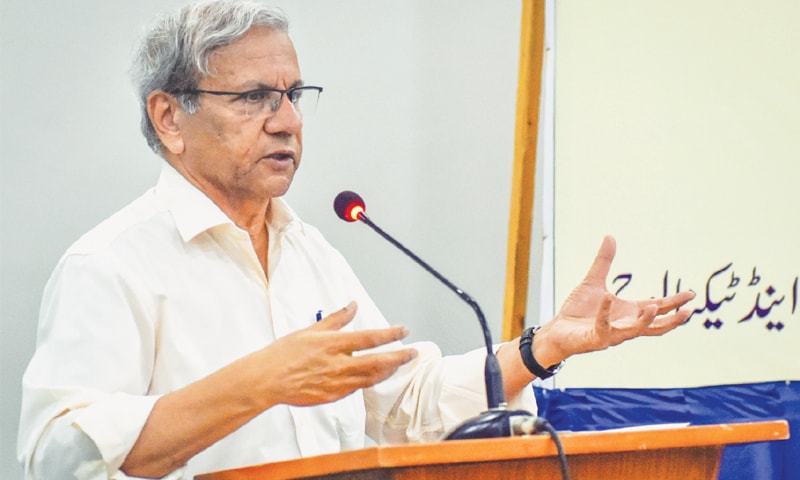KARACHI: The International Monetary Fund (IMF) is dealing with the International Monetary Fund to decide the fate of this country. Things won’t change until the people realise this and raise their voices. This was the concluding remark made by eminent economist Dr Kaiser Bengali in his keynote address at a consultation programme organised by Szabist and Piler to discuss the current economic policies of the government at the Arts Council of Pakistan on Thursday evening.
Dr Bengali said there were two gaps in the economy: the dollar gap and the rupee gap. The former has to do with the excess in imports in comparison to exports; the latter relates to the government’s excessive spending. The dollar gap is huge, which is why we have gone to the IMF. The rupee gap exists because if you [the government] keep on increasing your expenditure and ask the FBR to collect revenue, it’s not possible.
Dr Bengali said the gap between imports and exports was called trade deficit.
Solution to economic woes lies in cutting down on spending, says senior economist
“We are importing too much, and those responsible for it are [former prime minister] Shaukat Aziz and his team, which included Hafeez Sheikh, Ishrat Husain and Salman Shah.”
Till 2003, for every 100-dollar export, we used to have imports worth $125 to $130, a deficit of $25 to $30. Today, the difference is of $125. You can’t cover such a huge gap. Karkhaney [factories] are being closed. We have not diversified our exports. Two-thirds of our exports [are] textiles. The biggest issue is that of the imports. We have opened all the doors. Today we even have dog and cat food available at supermarkets. And this import/export gap is deliberate.
With regard to services deficit Dr Bengali said nijkari (privatisation) had enabled foreign companies to earn in rupees, convert their profit into dollars and send it abroad. The process speeded up so much that in 2009 the State Bank created a separate category in its data for it. “The state should be ashamed of itself that foreign companies fill water from our taps, put it into bottles, sell us the same water and send the profit in dollars abroad. The state can’t even provide us with clean water.” The same is the case with education. So, all [import] doors are open, he argued.
Speaking on the rupee deficit, Dr Bengali pointed out it did not matter who was chairman of the FBR. Everybody says that the FBR doesn’t collect taxes. But this economy doesn’t have enough gunjaish [capacity] to collect more taxes because the gap is big. It is true that tax has been evaded. But we are a country where two-thirds of tax comes from industries, and industries are being closed. Those who say that one per cent people pay their taxes are basically talking about direct taxes. Fifteen per cent taxes in Pakistan are direct and 85 per cent indirect which everyone pays. Those who talk about the agriculture tax should know that 80pc of kaashtkaar [farmers] in the country are small-time farmers, who are exempt from taxes. A total of 10pc come in the tax net.
Dr Bengali said the remedy lies in cutting down on spending, including on defence. At least 20pc needs to be cut down. There are 14 ministries, such as the ministry of national harmony, which we can do without. We have nine additional directors for the Post Office. [These things can be curtailed.]
Dr Bengali said: “We currently have a finance minister and governor State Bank who have come from abroad. Since 1993, we have had these ‘fly in, fly out’ consultants [Moin Qureshi, Shaukat Aziz, Hafeez Sheikh, etc]. The technocrats that don’t have their roots in the people are there for the money.” Our political governments don’t have a say in foreign policy, and now they have very little say in the economy. The economy has been taken over by IMF and the World Bank. In the past Hafeez Sheikh didn’t even pick chief minister Qaim Ali Shah’s phone. Today IMF is dealing with IMF to decide about Pakistan’s fate [qismat]. “Things won’t change until we come out in the streets and raise our voices. Closed-door conversations wouldn’t fetch anything.”
Earlier, welcoming the guests Dr Riaz Shaikh said when abrupt changes occurred in government, he and like-minded people thought about what’s going to happen to the country. They got in touch with Dr Bengali and decided to have a consultation meeting.
Zehra Khan and Karamat Ali also spoke.
Published in Dawn, May 10th, 2019














































